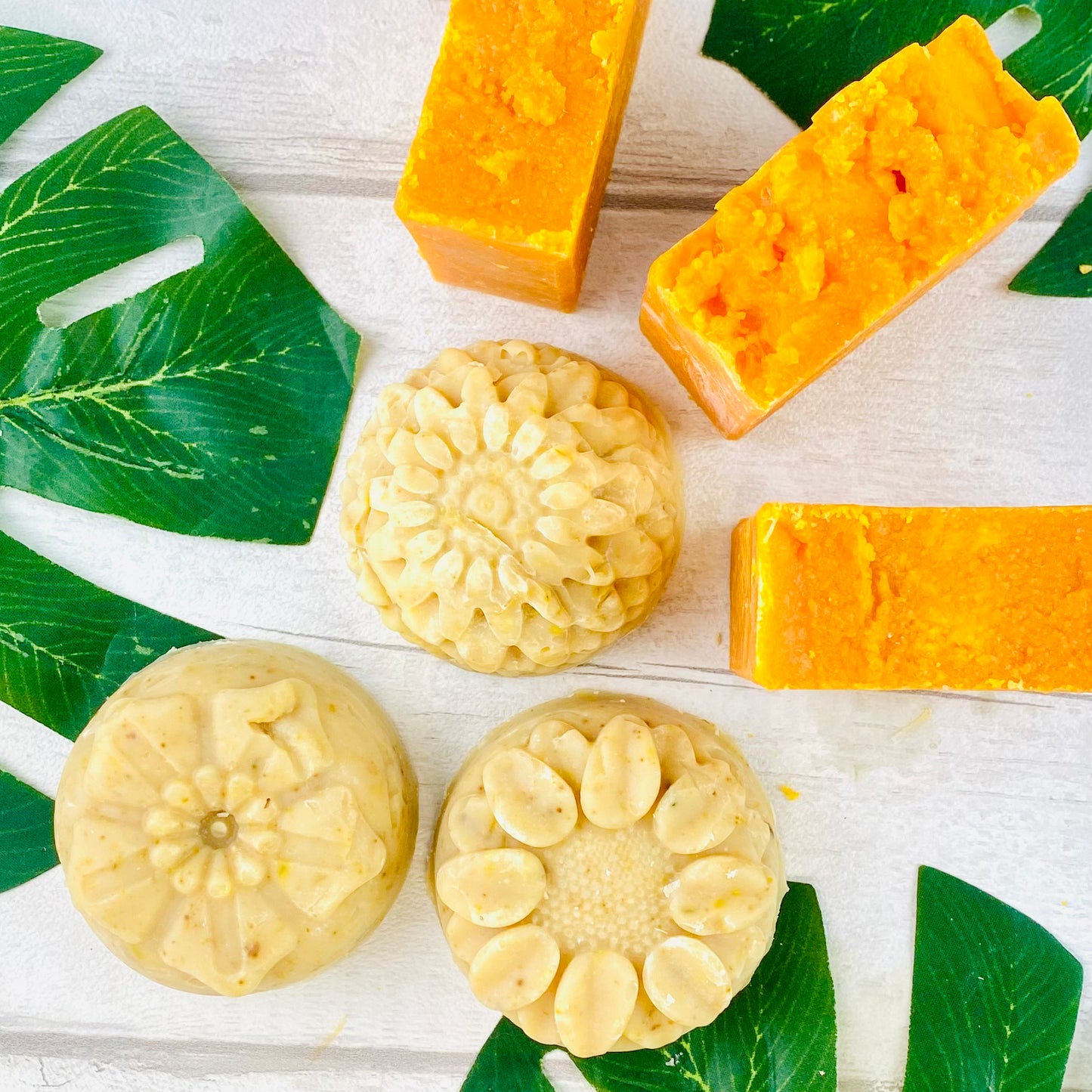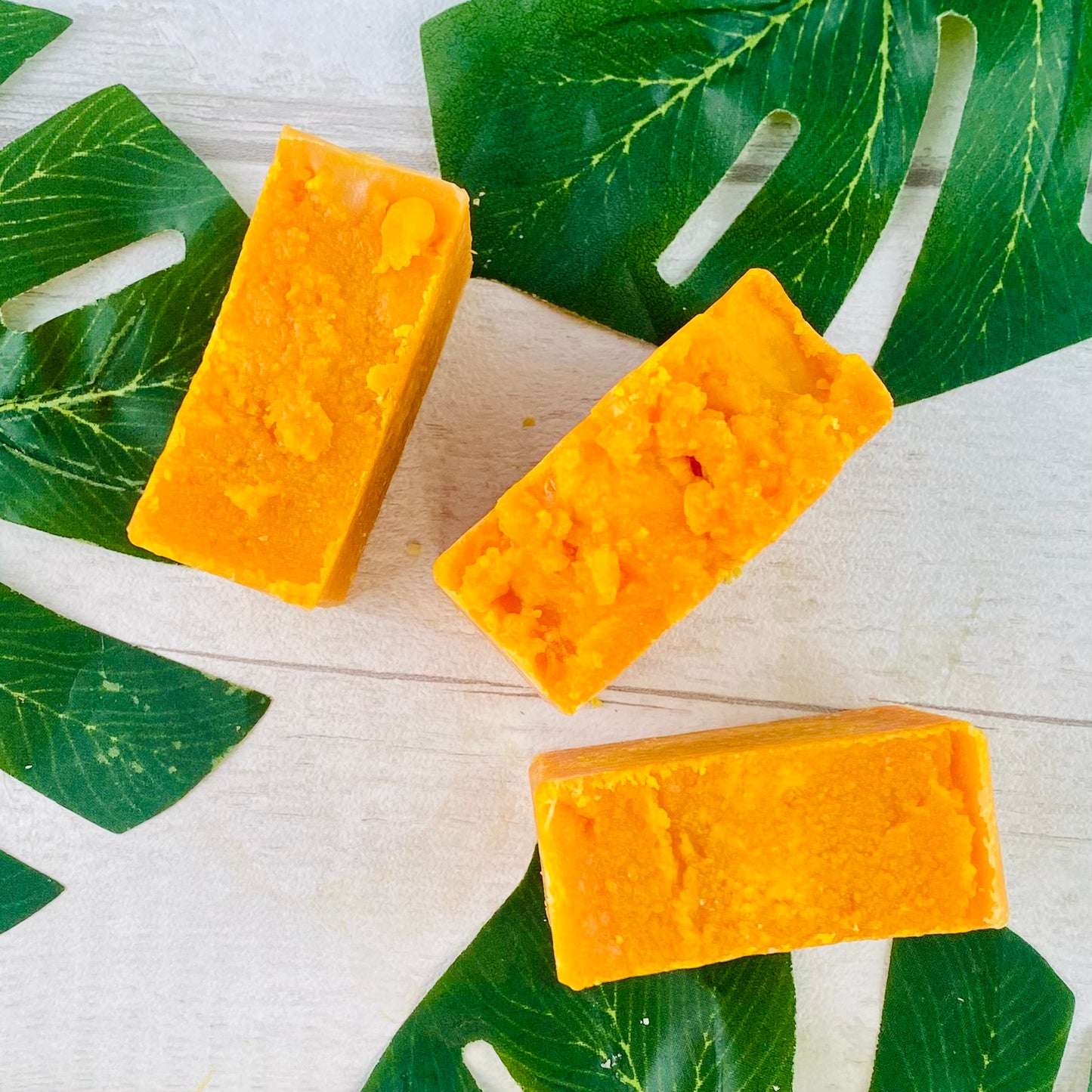IMPERFECT SOAPS
IMPERFECT SOAPS
Couldn't load pickup availability
From time to time, soapmaking goes not according to plan. These soaps are perfectly good excellent and safe to use but have visual defects. Basically, they didn’t come out perfect from the moulds! The colours and fragrances are the same. As I don't like to waste anything, I thought to offer them here instead.
Our 100% coconut oil soap bars bind coconut's moisturising benefits to nourish the skin while gently and effectively cleansing.
These slightly scented soap bars create a lovely soft lather that leaves the skin incredibly silky and moisturised. It is handcrafted in small batches with an exclusive formulation based on coconut oil's unique properties, creating a smooth and abundant lather. In fact, to make 100% coconut oil soap more hydrating, we reduce the amount of sodium hydroxide in the recipe by 25%. This ensures that the soap is still hard and fluffy but not drying to the skin. Thanks to their smooth lather, these bars can also be used as shaving soap.
Coconut oil is not really drying, it's just super cleansing. It cleans your skin so well that it strips the oils off your skin, making it feel dry. Coconut oil itself is good for your skin. Having 25% extra oil in the soap mitigates the drying effect, resulting in a really mild bar, gentle and safe even for the most delicate skin.
All our soaps are made using the cold process method, helping to preserve the beautiful properties of our ingredients. All the colours used in our soaps are made from roots, clays and botanicals. We don't use synthetic dyes, pigments, micas or oxides. Natural soap colourants can be infused into the oil or water we use to make our soaps, added directly to the soap before setting or used in the lye solution. To naturally scent our handmade soaps, we use only pure essential oils.
Please note that slight variations in shape, scent, colour, and weight may occur because this product is handmade. Make your soaps last longer by keeping them dry between uses. Please use a soap dish that drains and keeps it away from direct streams of water.
Handmade by THE GREEN BOUTIQUE, BN18 0LE Arundel, UK.
CPSR COCCOLE BODY SOAP by Oxford Biosciences Ltd.
WHAT DOES "COLD-PROCESSED SOAP" MEAN?
Cold-processed soap making is the traditional method used to create natural soap bars. It is made by combining oils and butters with water and sodium hydroxide, which causes a chemical reaction called saponification. Cold-processed soap, in particular, allows the lye to be neutralised without any outside sources of heat, called "curing".
After mixing sodium hydroxide (lye) with water and blending it with fatty oils, the mixture is poured into moulds and takes 24 hours to become soap (saponify). Once removed from the mould, it needs to dry for an additional 24 hours before being cut into individual bars.
Share
Ingredients
Ingredients
Ingredients Coccole Body Soap Lemon & Lemon Verbena.
Sodium Cocoate, Aqua, Glycerin, Sodium Citrate, Chamomilla Recutita Flower,
Citrus Limon (Lemon) Peel Oil, Lippia Citriodora Leaf Oil (Lemon Verbena) Oil, Sodium Lactate, Zea Mays (Corn) Starch, Calendula Officinalis Flower.
*Citral, Geraniol and Limonene are naturally occurring ingredients in essential oils.
Ingredients Coccole Body Soap Orange & Mandarin.
Sodium Cocoate, Aqua, Glycerin, Sodium Citrate, Citrus Aurantium Dulcis Peel (Orange) Oil, Citrus Nobilis Peel (Mandarin) Oil, Solanum Lycopersicum Fruit (Tomato) Extract, Sodium Lactate, Zea Mays (Corn) Starch, Citric Acid.
*Citral and Limonene are naturally occurring ingredients in essential oils.
Ingredients Coccole Body Soap Rosemary & Peppermint.
Sodium Cocoate, Aqua, Glycerin, Sodium Citrate, Spinacia Oleracea Leaf, Rosmarinus Officinalis (Rosemary) Leaf Oil, Mentha Piperita (Peppermint) Oil, Sodium Lactate, Zea Mays (Corn) Starch.
*Limonene is a naturally occurring ingredient in essential oils.
Ingredients Coccole Body Soap Ylang Ylang & Tea Tree.
Sodium Cocoate, Aqua, Glycerin, Sodium Citrate, Cananga Odorata Flower (Ylang-ylang) Oil, Melaleuca Alternifolia (Tea Tree) Leaf Oil, Papaver Somniferum Seed, Sodium Lactate, Zea Mays (Corn) Starch, Montmorillonite, Illite, Kaolin.
*Benzyl benzoate, Benzyl salicylate, Farnesol and Linalool are naturally occurring ingredients in essential Oils.
About the ingredients
About the ingredients
Sodium cocoate.
Sodium cocoate is the product of the saponification of Coconut oil by Sodium hydroxide. It is the sodium salt of fatty acids derived from Coconut oil, Cocos nucifera.
Aqua.
Aqua (water) is a liquid at standard temperature and pressure with the chemical formula H2O: one molecule of water has two hydrogen atoms covalently bonded to a single oxygen atom.
Glycerin.
Glycerin, or glycerol, is a simple polyol compound with three hydroxyl groups: a colourless, odourless, viscous liquid. Glycerin is naturally occurring in all animals and plant matter in combined form as glycerides in fats and oils, or, in intracellular spaces, as lipids. The glycerol backbone is central to all triglycerides, and its molecular formula is C3H8O3.
Sodium citrate.
Sodium citrate is the sodium salt of citric acid with the molecular formula Na3C6H5O7
Sodium lactate.
Sodium lactate is the sodium salt of lactic acid with the molecular formula: C3H5NaO3.
Zea mays starch.
Zea mays starch is a high-polymeric carbohydrate material usually derived from the peeled seeds of the Corn, Zea mays L., Gramineae.
Citric acid.
Citric acid is a hygroscopic 𝛂 and β hydroxytricarboxylic acid, naturally found in citrus fruits, with the molecular formula C6H8O7.
Calendula officinalis flower.
Calendula officinalis flower is plant material derived from the flowers of the Calendula, Calendula officinalis L., Compositae.
Chamomilla recutita flower.
Chamomilla recutita flower is the flower of Chamomilla recutita (L.), Asteraceae.
Citrus limon peel oil.
Citrus limon peel oil is the volatile oil obtained from the fresh peel of the Lemon, Citrus limon (L.), Rutaceae.
Lippia citriodora leaf oil.
Lippia citriodora leaf oil is the volatile oil obtained from the leaves of Lippia citridora, Verbenaceae.
Citrus aurantium dulcis peel oil.
Citrus aurantium Dulcis peel oil is the volatile oil obtained by expression from the fresh peel of the ripe fruit of the sweet orange, Citrus aurantium var. Dulcis, Rutaceae.
Citrus nobilis peel oil.
Citrus nobilis peel oil is the oil expressed from the peel of the Mandarin, Citrus nobilis, Rutaceae.
Solanum Lycopersicum fruit extract.
Solanum Lycopersicum fruit extract is an extract obtained from the fruit of the Tomato, Solanum Lycopersicum L., Solanaceae.
Spinacia oleracea leaf.
Spinacia oleracea leaf is the leaves of Spinach, Spinacia oleracea L., Chenopodiaceae.
Rosmarinus officinalis leaf oil.
Rosmarinus officinalis leaf oil is the essential oil obtained from the flowering tops and leaves of the Rosemary, Rosmarinus officinalis L., Lamiaceae. The majority of constituents are monoterpenes and oxides.
Mentha piperita oil.
Mentha piperita oil is the volatile oil obtained from the whole plant of the Peppermint, Mentha piperita (L.), Labiatae.
Cananga odorata flower oil.
Cananga odorata flower oil is the oil obtained from the flower, Cananga odorata, Anonaceae. The majority of constituents are sesquiterpenes, esters and monoterpenols.
Melaleuca alternifolia leaf oil.
Melaleuca alternifolia leaf oil is the oil distilled from the leaves of the Tea tree, Melaleuca alternifolia, Myrtaceae.
Papaver somniferum seed.
Papaver somniferum seed is the seed of the Opium poppy, Papaver somniferum L., Papaveraceae.
Montmorillonite.
Montmorillonite is a very soft phyllosilicate group of minerals that typically form in microscopic crystals, forming a clay.
Illite.
Illite is a clay mineral having an intermediate composition between montmorillonite and muscovite.
Kaolin.
Kaolin (kaolinite) is a naturally occurring clay mineral with the chemical composition Al2Si2O5(OH)4. It is a layered silicate mineral, with one tetrahedral sheet linked through oxygen atoms to one octahedral sheet of alumina octahedra.
How to use
How to use
Apply the soap to wet hands, rub together to create a lather, wash, and rinse off. In case of contact with eyes, rinse with clean water immediately. If irritation occurs, stop use. Keep out of reach of children.
Packaging
Packaging
Recyclable paper bag.
I have to admit to finding no imperfections in the soap delivered, it still looked beautiful and smelt absolutely divine!
I got given a “perfect” one in a Xmas gift set this year and loved it so much already, I’m already wanting replacements. The imperfect idea of this is wonderful. And I shall keep buying the imperfect and perfect ones for as long as you make them. Great scrub and also soft and nourishing all over. A real treat
GET CONNECTED
Do you want the latest from our blog straight to your inbox? Sign up for our newsletter and get special offers and updates!




